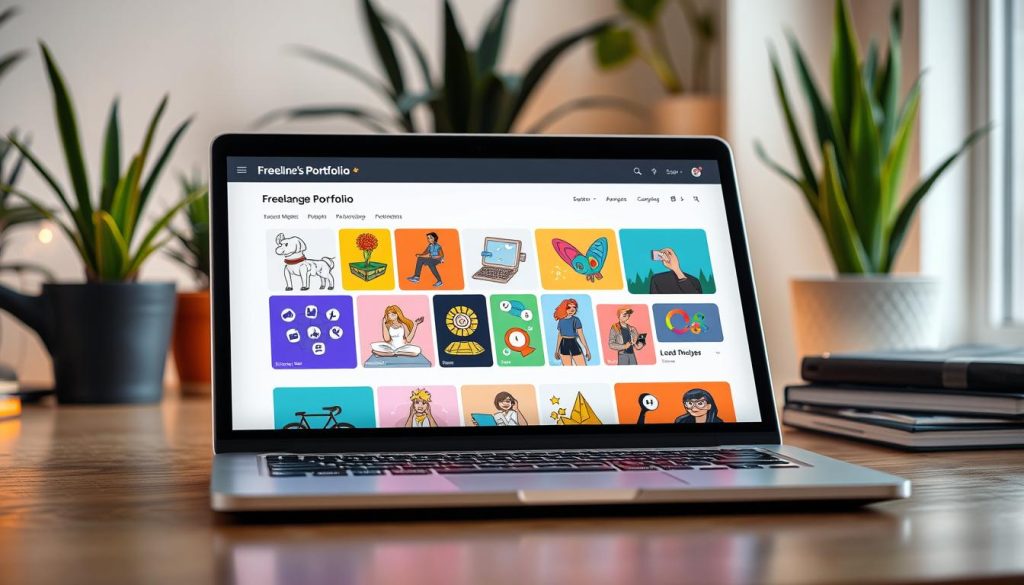The digital freelancer scene has changed how people work in the UK. More people want to make it big online. To stand out, it’s crucial to know the best ways to work as a freelancer.
This guide will help you find your special area, boost your online image, and keep good client relationships. It covers everything you need to know to succeed.
The Rise of the Digital Freelancer

The freelancer economy is growing fast, changing how work is done across different areas. This change is thanks to new technology and changes in what workers want. More people are now looking for freelance work, making the digital workforce more varied.
Understanding the Freelancer Economy
Companies are changing how they work, and the freelancer economy is booming. Websites like Upwork and Fiverr are key in linking freelancers with businesses. This has let many workers move away from traditional jobs for more flexibility and control. With high unemployment, many are finding new ways to earn, like freelancing, which lets them choose their career paths.
Trends Influencing the Digital Workforce
Several trends are changing the digital workforce. Key ones include:
- The gig economy, which offers short-term, project-based work.
- Niche services that meet specific client needs.
- The COVID-19 pandemic, which made remote work more popular.
These trends show how work is changing and how freelancers are becoming more important. They offer big chances for those wanting to succeed in this new world.
Identifying Your Niche as a Freelancer

Finding the right freelancer niche is key to a successful career. By focusing on a specific area, you can meet client needs better. This part looks at how to pick a niche and check its demand.
Choosing Your Area of Expertise
Choosing your expertise starts with knowing your skills, interests, and past work. Here’s how to spot potential niches:
- List Your Skills: Write down all your skills and knowledge.
- Assess Your Interests: Think about what you like doing; passion helps you succeed.
- Research Existing Niches: Look at niches that fit your skills and interests.
- Identify Unique Selling Points: Find what makes your services different.
Using a strategic method will help you stand out in your chosen area.
Evaluating Market Demand
Understanding what clients want is part of market demand analysis. Here are some ways to do it:
- Conducting Competitive Analysis: Look at competitors to see what they do well and what they don’t.
- Gathering Customer Feedback: Talk to your target audience through surveys or social media to learn what they need.
- Utilising Trend Analysis: Stay updated with industry trends that affect demand for certain services.
- Networking: Talk to professionals in your field to learn what clients are looking for.
Doing a deep market demand check helps you match your services with what clients want. This ensures a successful freelancing career.
Essential Skills for a Successful Digital Freelancer

Being a successful digital freelancer means having the right skills. These skills improve your work and make your services better for clients. You need both technical and soft skills to build a strong freelance career.
Technical Proficiencies
Technical skills help you do your job well. Knowing the latest software, like Adobe Creative Suite for designers or coding languages for web developers, makes a big difference. Understanding tools for data analysis or managing projects is also key to doing great work.
- Proficiency in design software like Adobe Illustrator or Photoshop
- Knowledge of coding languages such as HTML, CSS, or JavaScript
- Experience with project management tools like Trello or Asana
- Understanding of data analytics software for performance tracking
Soft Skills and Communication
Soft skills are just as crucial in freelancing. Good communication is key to building strong client relationships. Being able to solve problems quickly and adapt to new project needs is vital. Managing your time well helps you meet deadlines and handle many projects at once.
- Strong verbal and written communication skills
- Ability to collaborate and work well with clients
- Problem-solving mindset to tackle unexpected hurdles
- Excellent organisational and time management capabilities
Creating a Professional Portfolio

Creating a standout freelance portfolio is key to drawing in clients and showing off your skills. A good portfolio not only shows your abilities but also mirrors your professional image. Make sure your portfolio looks good, is easy to understand, and is relevant to your work. This will grab the attention of potential clients and set you apart in a crowded market.
Showcasing Your Work Effectively
When showing off your work, focus on your best pieces. Here are some tips:
- Use high-quality images or videos to represent your projects.
- Organise your projects by category or type for easy navigation.
- Include brief descriptions that outline the project’s objective and your role.
A clear layout makes it easy for clients to see what you can do. Tell the story behind each project to make it relatable. This shows your thought process and how you solve problems.
Leveraging Testimonials and Case Studies
Adding client testimonials and case studies to your portfolio can make it much more powerful. Testimonials prove your skills and professionalism. Here’s how to use them:
- Gather quotes from happy clients and show them off.
- Include case studies that explain the problems and how you solved them.
- Highlight the results you got from your work.
These parts make you look credible, making it easier for potential clients to trust you. Using digital platforms like Behance, Wix, or WordPress lets freelancers create a professional online space. This space showcases your work and draws in potential clients.
Building Your Online Presence

Having a strong online presence is key for freelancers in today’s world. Personal branding is the base of this effort. It lets freelancers show their unique value to potential clients. A strong brand identity makes you stand out and builds trust and recognition.
Importance of Personal Branding
A clear personal brand shows you’re professional and skilled. Telling a story about who you are and what you offer boosts your online presence. Here are some tips:
- Develop a unique value proposition that reflects your skills and services.
- Create a professional bio that highlights your experience and achievements.
- Maintain consistent messaging across all platforms to build recognisability.
Utilising Social Media Platforms
Social media is vital for reaching more people and connecting with clients. Sites like LinkedIn, Twitter, and Instagram are great for promoting your work and talking to your audience. Here’s what to do:
- Share content that shows off your knowledge and skills.
- Talk to industry leaders and potential clients to grow your network.
- Use visuals and stories to make people more interested and engaged.
Networking as a Digital Freelancer

For digital freelancers, building a strong network is key. It helps you find new opportunities and get support. By connecting with others, you learn about the latest trends and build lasting relationships.
Connecting with Other Professionals
Here are ways to grow your professional circle:
- Use social media like LinkedIn and Twitter to connect with other freelancers in your field.
- Go to online events and webinars to meet people who share your interests and industry leaders.
- Join groups for freelancers where you can talk about work and find new partners.
Participating in Online Communities
Online groups are vital for your freelance career. Being active in forums and freelance networking sites lets you share your journey and learn from others. These spaces keep you informed about the latest in your field, offer support, and help you work with other freelancers.
Finding Clients and Opportunities

For digital freelancers, finding clients is key to a successful business. There are many ways to find work, with freelance platforms being a big help. Knowing how these platforms work can make freelancers better at finding jobs.
Utilising Freelance Platforms
Platforms like Freelancer, Guru, and PeoplePerHour are great for meeting new clients. They let freelancers show off their skills and bid on jobs they’re good at. The good things about these sites are:
- A big group of people looking for certain skills.
- Safe payment systems that protect both sides.
- Quick trust building with client reviews and ratings.
To stand out, it’s important to make a strong proposal. Here are some tips:
- Make your pitch personal, showing you really care.
- Point out your past successes that fit what the client wants.
- Be clear about when you can finish the job and what you’ll do.
Cold Pitching and Outreach Strategies
Cold pitching is another good way to find work, especially for jobs not listed online. A good cold pitching plan includes:
- Really getting to know potential clients and their problems.
- Writing emails that talk directly to their issues.
- Keeping in touch with clients, showing you’re serious.
Working on these strategies can really help in finding clients and getting work. Using freelance sites and being active in outreach can make freelancers more visible and bring in more kinds of work.
Setting Your Freelance Rates

Figuring out the right freelance rates is key to a successful freelance career. It’s important to know the going rate and use smart pricing strategies. This helps freelancers stand out in their field. We’ll look at how to find out what others charge and set rates that match your skills and what clients expect.
Understanding Market Rates
Looking at what others with similar skills charge is a good start. This helps freelancers set fair rates without selling themselves short. Here are ways to find out what others earn:
- Check out freelance platforms to see what rates are common in your area.
- Join professional networks or forums to talk about pricing with others.
- Look at industry reports for average freelance rates in different fields.
Knowing the market rates helps when you’re talking to clients and setting your freelance rates.
Value-Based Pricing Strategies
Value-based pricing means setting rates based on how much value you bring to clients, not just how long it takes to do the job. This method includes:
- Spotting what makes you different from others.
- Telling clients how your skills solve their problems.
- Setting prices based on the project’s impact, not just the work involved.
This way, you can charge more and still keep clients happy. It’s about showing the worth of your work.
Managing Your Time Effectively

For digital freelancers, getting good at time management is key. It helps keep productivity high and leads to success. Using the right tools and scheduling methods can greatly improve your work and efficiency.
Tools and Techniques for Time Management
Tools like Trello and Asana make managing tasks easier. They help track progress, set deadlines, and handle many projects at once. Apps such as Toggl or Harvest let freelancers keep an eye on their hours. This ensures their work meets business goals.
For freelancers with many projects, scheduling well is vital. Techniques like the Pomodoro Technique boost focus. Prioritising tasks by urgency helps with a structured plan. Breaking big projects into smaller tasks also helps avoid feeling overwhelmed and boosts productivity.
- Set clear daily and weekly goals to maintain focus.
- Establish a consistent work routine to foster discipline.
- Avoid distractions by creating a dedicated workspace.
- Regularly review your progress to refine time management strategies.
The Importance of Contracts in Freelancing

For freelancers, making strong agreements is key to good client relationships. Freelance contracts are vital. They make sure everyone knows their roles and responsibilities. They help avoid misunderstandings and disputes.
Creating Clear Client Agreements
Good client agreements have important parts that set the project’s rules. These include:
- Scope of Work: Clearly outline the tasks and deliverables expected from both parties.
- Payment Terms: Specify rates, payment schedules, and methods to ensure timely compensation.
- Deadlines: Establish realistic timelines for the completion of work to keep the project on track.
- Revisions: Include terms for any modifications or adjustments to the original proposal.
- Termination Conditions: Define under what circumstances either party may terminate the agreement.
By focusing on these key points, freelancers can make contracts that protect them and help build strong client relationships. A clear freelance contract makes work more professional. It lowers the chance of conflicts and builds trust and clarity in the work environment.
Handling Client Relationships

Building strong client relationships is key for freelancers in the digital world. Good communication and managing expectations well are the basics for lasting partnerships. Using smart communication strategies can really improve your bond with clients. This makes them feel important and involved in the project.
Effective Communication with Clients
Keeping clients updated and being proactive is crucial. Here are some tips for better communication:
- Have a regular schedule for sharing project updates, keeping things clear.
- Ask for feedback to know what clients need and fix any issues quickly.
- Use different ways to communicate, like emails, video calls, and messaging apps, to fit what clients like.
Managing Expectations and Deliverables
It’s important to set realistic goals for what you can deliver. Here’s how to manage expectations well:
- Clearly explain what the project will cover and when it will be done at the beginning.
- Be honest about any possible problems and how they might affect what you deliver.
- Have check-ins at key points to see how things are going and adjust plans if needed.
The Legal Aspects of Freelancing

Understanding the legal side of freelancing is key for a successful career. Freelancers must follow legal rules to stay on the right track and protect their work. This means knowing about tax laws, which are a big part of freelancing.
Understanding Tax Obligations
In the UK, freelancers must understand their tax duties to avoid legal trouble. They need to sign up with HM Revenue and Customs (HMRC) for income tax. If they earn a lot, they might also need to register for VAT.
It’s vital to keep an eye on your earnings and spending. This helps figure out your tax duties and lets you claim business expenses you can deduct.
National insurance contributions are another legal thing freelancers need to think about. These depend on how much you earn and can affect your benefits later. Keeping detailed records helps with tax, and it’s good for planning your pension and future finances.
Freelancers should get to know about tax returns and deadlines. Not following these can lead to fines. So, it’s important to plan well and follow the law. Getting help from a professional can make things easier and keep you in line with the law.
Financial Management for Freelancers

For freelancers, managing money well is key, especially with their unpredictable income. A good budget helps predict earnings and cover costs during slow times. It’s vital to keep track of both regular and changing expenses to manage finances well.
Budgeting and Forecasting Income
Here are some top tips for freelancers when budgeting:
- Set a monthly budget that includes all your expected costs.
- Keep an eye on your income to spot trends and patterns.
- Save some extra for unexpected costs or new chances.
Forecasting your income helps you see what you’ll earn in the future. By looking at past earnings, you can make better financial plans and set achievable goals.
Saving for Taxes and Retirement
Since freelancers don’t have an employer taking out taxes, they must save for them themselves. It’s wise to put aside 25-30% of your earnings for taxes. This way, you avoid a big tax bill at year’s end.
Don’t forget about saving for retirement. Freelancers can use plans like a self-invested personal pension (SIPP) or a stakeholder pension. Even small regular contributions can grow over time, securing your future.
Sustaining Your Motivation as a Freelancer

Freelancers often find it hard to stay motivated because of their flexible work. Having clear personal goals is key to keeping motivation high. It also helps in tackling daily tasks with a clear purpose. It’s important to find ways to balance work and life to avoid burnout and stay productive over time.
Setting Personal Goals
Setting personal goals is like having a roadmap for freelancers. It helps them stay focused and motivated. Use the SMART criteria—specific, measurable, achievable, relevant, and time-bound—to make your goals clear. This makes it easier to track progress and stay on track.
- Define short-term goals to achieve manageable tasks regularly.
- Establish long-term aspirations that align with your career direction.
- Review and adjust your goals periodically to reflect changing circumstances.
Maintaining Work-Life Balance
For freelancers, a healthy work-life balance is crucial. The flexible nature of freelancing can make it hard to separate work from personal life. This can lead to stress and lower motivation. Setting clear boundaries helps protect your well-being and boosts productivity.
- Create a designated workspace, separate from personal areas.
- Establish a daily routine that includes breaks to rejuvenate.
- Communicate your work schedule to family and friends to minimise distractions.
The Future of Digital Freelancing
The future of freelancing is set to be shaped by new digital trends. Technology, like artificial intelligence and automation, is changing how freelancers work. These tools boost productivity and let freelancers focus on special areas, meeting client needs better. It’s key for freelancers to keep up with these changes to stand out.
There’s also a big need for freelancers with a mix of technical and soft skills. Clients want freelancers who can handle data analytics, social media, and client management. It’s vital for freelancers to keep learning and getting better at these skills. Being able to change and meet new market demands will define success in the future.
Changes in laws about work and freelancing could also affect the industry. Freelancers need to keep up with these changes to manage their careers well. By staying informed and flexible, digital freelancers can handle whatever the future brings.
















